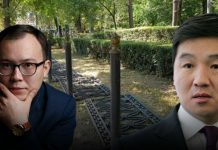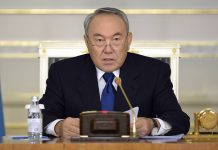Social conflicts are an integral part of natural development of any nation. They are the litmus test that of the processes in society. But it should be mentioned that social conflicts as any other conflict in general may be either constructive or destructive. The first type of conflict is inherent in any civilized society living under the rule of law and contributes to its development. Whereas a destructive social conflict is typical for a society characterized by frequent crises of political legitimacy and may lead to prolonged stagnation.
The recent history shows that after the collapse of the Soviet Union Kazakhstan has been the only island of stability that managed to avoid drastic social consequences.
According to the survey on social conflict in Kazakhstan conducted by the «Open Society» International Institute for Regional Studies by request of the Kazakhstan Institute for Strategic Studies under the President (KazISS) in 2010), there are no signs that could lead to future mass protests in Kazakhstan. 38.5% of the respondents excluded that possibility and 33.5% considered it very unlikely. Only 3% of the respondents believed that there was a reason for the protest and 18.2% thought that such kind of development was possible.
When a social conflict is understood as a conflict where each party, a social group or individual, has a position that is contrary to the interests of the others, we are able to identify the types of conflict:
• conflicts of political nature caused by struggle for distribution of power, domination, influence and authority. These conflicts are directly related to the conquest for the leading positions in the institutions and structures of political power. The main types of political conflict are: a conflict between the branches of state power; conflict within the Parliament; conflict among political parties and movements; conflict among the various levels of managerial staff, etc.
• conflicts of socio-economic nature caused by unemployment, inflation, law wages, unfavorable condition to realize professional and intellectual potential, poor social guarantees, etc.
Stability of a political system depends on two main parameters: standard of living and income equality. In 2010, 25.3% of people living in Kazakhstan approved the socio-economic course in general, 62.9% supported the social policy conducted by the government. However, there were a number of things that concerned the respondents. When asked about the most pressing issues in Kazakhstan, 49.8% of the respondents chose unemployment and 79.9% were concerned about rise in prices and inflation. In addition, a great number of the respondents pointed at increasing income inequality.
• conflicts rooted in inter-ethnic relations caused by struggle for the rights and interests of ethnic groups.
It should be noted that this classification is quite relative because there is always a possibility of a hybrid conflict of more complex nature that includes ethnic, political, economic and other factors
Now we may take a closer look at the mechanisms for prevention of ethnic conflicts in Kazakhstan. Given the fact that more than 120 different ethnic groups coexist peacefully the country, the example of Kazakhstan is an invaluable experience of constructive conflict prevention.
Throughout centuries-old history, the Kazakh people have been known for their tolerance and ability of harmonious co-existence with other ethnic groups.
Under the Constitution of Kazakhstan any discrimination on racial, national, ethnic and linguistic grounds is prohibited. The country fully supports the participation of all ethnic groups in public and political life.
Since gaining its independence, Kazakhstan has been successfully generated a culture of interethnic communication to fulfill strategically important tasks such as maintaining the sovereignty and territorial integrity, inter-ethnic and inter-religious peace, economic and political stability. All this helped to avoid and prevent conflict in social sphere.
According to the results of expert poll conducted by the Kazakhstan Center of Humanitarian and Political Studies from August to October 2010 in the North, South, East and West of Kazakhstan, the vast majority of 85 — 87% assessed the inter-ethnic their regions as «satisfactory”. At the same time 48.9% of experts believed that inter-ethnic relations in their region were «good».
Most of the experts (60.2%) considered the ethno-political situation in Kazakhstan “peaceful” meaning that it was relatively “good”. Only 28.5% experts rated the ethnic-political situation in Kazakhstan as “Satisfactory”. The remaining 11.2% experts believed that the ethno-political situation in Kazakhstan to be uncertain or tense. A significant number of experts noted a high probability for increase of political demands from non-titular ethnic groups in Kazakhstan. Thus, 13 experts said that the probability for political claims from non-Kazakhs was from 50% to 70% and 5 experts said it was more than 30%.
There should be appropriate institutions to prevent and resolve conflict in the event of escalation. Kazakhstan has invented a unique one that is the Peoples’ Assembly of Kazakhstan.
The Assembly was established in accordance with the Decree of the President of the Republic of Kazakhstan on March 1, 1995 as an advisory body to the Head of State.
The Assembly is focused on the following tasks:
— contribute to preservation of inter-ethnic and inter-confessional harmony and stability in Kazakhstan;
— recommend on public policies aimed at development of friendly relations among the ethnic groups living in Kazakhstan, promotion of their spiritual and cultural revival and development based on the principle of equality;
— formation of a political culture based on democratic norms;
— mainstreaming of diverse interests of ethnic comminutes in the national policy conducted by the government;
— search for compromises to resolve social contradictions.
It should be noted that the Assembly works closely with the smaller assemblies that are established in all regional centers and in the cities of Astana and Almaty.
The Assembly has become a respected public institution, successfully performing its function of harmonization of interethnic relations.
In 2008 the XIV session of the Peoples’ Assembly of Kazakhstan formulated the five basic principles of the Kazakhstan model of interethnic tolerance: unity of the people; tolerance and responsibility as the most important values of the nation; consolidating role of the Kazakhs as the core ethnic group in state-building; ethnic, confessional, cultural and linguistic diversity; favorable conditions for development of cultures and languages maintained at state level.
The Assembly resolved that national unity is the contemporary world must be based on the following factors: building of a common state, tolerance, citizenship and compulsory use of the state language. The Assembly confirmed the historical mission of the Kazakh people to become the core factor of national unity to preserve independence and the Kazakh state on the indigenous Kazakh land. As for the other foundations of national unity, the Assembly noted common history and values including independence, respect for elders and family, special care for children, hospitality, good-neighborliness.
The Congress of the Leaders of World and Traditional Religions held in Astana is also an important institution that provides ethnic and religious peace in Kazakhstan.
The First Congress was summoned at the initiative of President Nursultan Nazarbayev on 23-24 September 2003. It was attended by the most authoritative representatives of Islam, Christianity, Judaism, Shintoism, Hinduism, and Buddhism. The forum brought together the leaders of world and traditional religions for the first time. The Congress adopted the Declaration where inter-confessional dialogue was regarded as one of the most important instruments for maintenance of peace and harmony among peoples and nations of the world.
It was decided to hold the Congress of World and Traditional Religions in Astana on a regular basis. This decision means international recognition of the role and place of Kazakhstan in the international arena.
The initiative of Kazakhstan to convene a forum for inter-confessional dialogue to reach common visions to reduce tensions in the world was an adequate response to the challenges of our time. It was appreciated and supported by international community.
Inter-confessional and inter-ethnic peace is important factor for sustainable development, civil society and preservation of statehood. Kazakhstan has achieved much and become a nation whose experience in dealing with these complex issues can be valuable for international community














